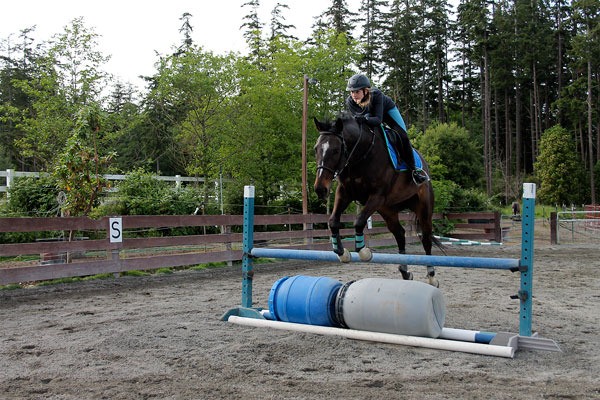Sitting atop the saddle 10 feet off the ground is a powerful feeling. Regardless of the reason, be it the lofty heights, the sensation of being top dog or simply being perched on a towering horse is empowering.
The sensation doesn’t exclude the disabled, either. Riders of all kinds, from internationally recognized dressage riders to the physically impaired have opportunities to ride right here on South Whidbey as riding season is in full swing.
The sound end has produced top talent over the years. As recently as the end of April, Clinton’s own Maya Black and her horse Cody placed third at Rolex Kentucky, one of the world’s most prestigious multi-day eventing competitions. Eventing is an Olympic sport that combines dressage, a sort of synchronized series of movements between horse and rider, cross country and show jumping. Black is currently ranked sixth nationally by the United States Eventing Association.
Black started out riding with the South Whidbey Pony Club from a young age before she left the island for college and later more competitive eventing training across the country and across the pond in England. The South Whidbey riding scene is diverse in the opportunities available for riders young and old, and offers a nurturing environment for development, according to Black.
“I grew up riding here on South Whidbey and in the Pony Club and it was probably the biggest influence for me as far as finding a starting spot within the sport,” Black said. “There is a great core of talented riders and coaches to help build that competitive edge if you want to make the next step up.”
The aspect of horseback riding and equestrian on South Whidbey that sets it apart, according to Black, is the diversity of riding styles available from the stables. The South End’s horse stables offer activities ranging from trail riding to the more rancher-oriented western style. There is also English-style cross country and show jumping and dressage, which is Black’s style.
The average rider has multiple stable options to choose from. Harmony Hill Stables in Freeland offers English-style riding lessons for riders of all skill levels and provides a hands-on experience where riders care for the horses themselves. Equestrian Crossings, with arenas located in Greenbank and Oak Harbor, offers a more varied set of programs including vaulting, a hybrid of gymnastics and riding, and western style.
“Riding is really about this wonderful relationship the rider builds with this animal,” said Sarah Moulton, owner and trainer of Harmony Hill Stables. “In a way, it allows you to become a stronger individual by teaching you how to be in charge. It teaches assertiveness, and builds a lot of transferrable life skills.”

While Black’s accomplishments bring the South Whidbey community together with pride, it’s a different bond that horses build that can have a more powerful impact, according to Dale Kerslake, Programs Coordinator at M Bar C Ranch. The M Bar C Ranch is specifically geared towards children with special needs, whether mental, physical or financially challenged, and the impact a horse’s touch can have is monumental for the children and their families, according to Kerslake. It offers a western get away first and foremost, but the interaction with horses is the most therapeutic aspect of the experience for many.
“Here at the ranch, these kids and their families are facing some pretty profound challenges, and when they come they just get to be a kid and forget about their troubles, whatever they may be,” said Kerslake. “Kids can just enjoy the 50 plus acres and interact with this massive animal, the horse. The impact a big animal like a horse can have on the kids is vital.”
Horses have proven to be therapeutic for some time here on South Whidbey. Outside of the M Bar C Ranch, nonprofit organization Hope Therapeutic Riding Center and multi-program stable Equestrian Crossings offer adaptive or therapeutic horseback riding for special needs children. At the M Bar C Ranch, a loading platform for disabled children allows for them to perch on the heavily trained and docile horses, with side walkers accompanying the riders for safety. The horses at the ranch are all donated, often ex-show horses in their later years.
“Sometimes it’s more important for the parents to see their child with the horse than the child themselves,” Kerslake said. “We’ve had a few parents cry after seeing their kid on top of that horse.”
It’s a moment that can be life changing for the kids, such as bringing a smile out of an autistic child for the first time or prompting a kid to speak their first words. A few months back, one autistic child’s breakthrough saw them whisper, “Thank you,” into a horses ear. It was the first time they had ever spoken.
“Therapeutic riding is such a huge asset,” Black said. “They do a wonderful job.”
There is something about horseback riding that is empowering yet relaxing for not only for special needs youth, but for even the best riders, according to Kerslake.
“Maybe it’s the same for all of us as the special needs kids, I just feel good on a horse,” Kerslake said. “It’s calming and therapeutic. When I’m out there on a horse, it makes me feel happy and gives me time to forget about everything for a while and enjoy being on this massive animal that has a bond with me as it listens to my queue.”

